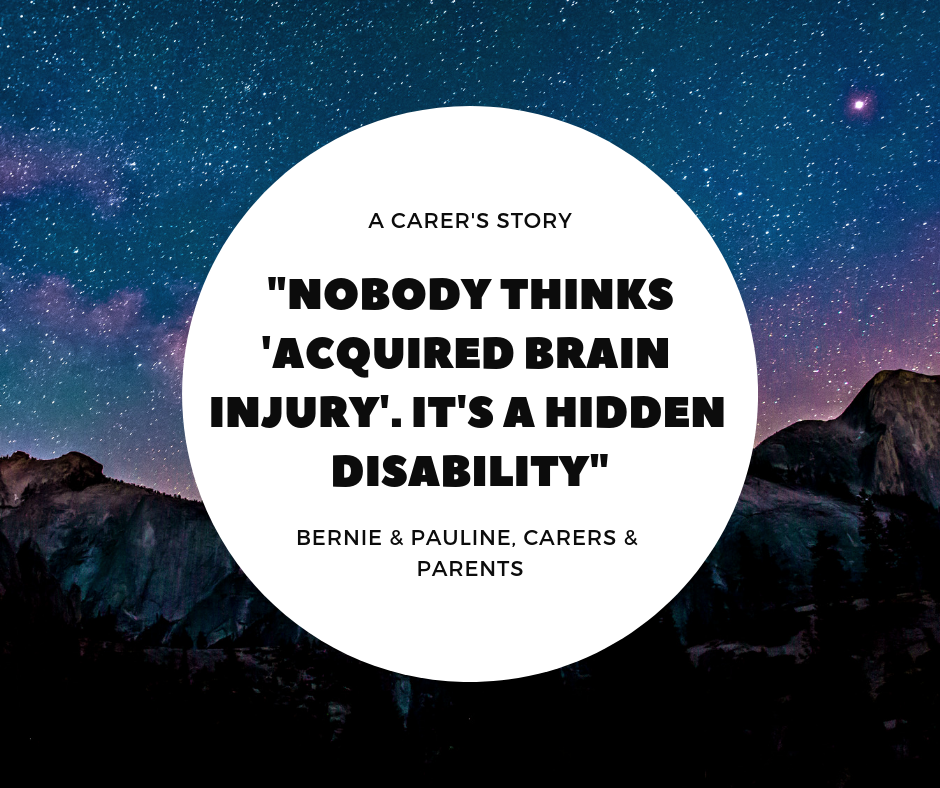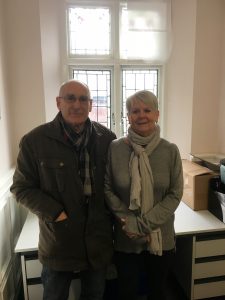
Traumatic brain injury – A carer’s story
This month marks exactly 10 years since Pauline and Bernie’s son, Gary, suffered a traumatic brain injury.

The exact date and time, 3 November 2008 9.45pm, will be etched on their minds forever. Gary was loving life and working at a tattoo studio at the time. After work, he left with a colleague to go and see a band play, but the music wasn’t quite to his liking, and so he left early. He was hurrying through Tottenham Court Road Underground Station when he lost his footing on the stairs and hit his head so hard he was knocked unconscious. A passer-by called for an ambulance.
Emergency surgery following traumatic brain injury
Gary was taken directly to The Royal London Hospital where he had to undergo emergency brain surgery to save his life having sustained three blood-clots in his brain.
It wasn’t until 1.15am that Bernie picked up a telephone call from the Police informing him that Gary was critically ill in hospital. By the time Bernie and Pauline arrived at hospital he was already half way through a life-saving operation. Thankfully, he pulled through.
The next day, in ICU, Gary was rushed back into surgery following another blood clot on the brain. It was one of the worse days of their lives.
After spending two weeks in a coma, he was gradually woken up. Pauline and Bernie had been told to expect that Gary would have a long road to recovery, but nothing could prepare them for his reaction.
“It was terrifying” recalls Pauline. “He was confused, angry, and pulling all his wires out at every opportunity”. In the end, nurses had to restrain Gary to keep him safe.
“What I didn’t expect was the regression” adds Pauline. “Gary would plead with me to take him home and would say ‘I’ll be a good boy, mum’, when he was 40 year-old man living independently”.
Eventually he was transferred to Romford Hospital, where he spent many weeks. It was a “very difficult time” recalls Pauline as “Gary’s anger and frustration became really bad. One day he got so angry he started eating anything he could get his hands on, which is dangerous because he is diabetic”. It was also really upsetting for Pauline and Bernie who visited Gary on a daily basis.
Getting back to independent living
As part of his recovery and to prepare him for independent living, Gary was transferred to the Blackheath Brain Injury Rehabilitation Centre. His stubbornness and determination not to give up meant he pushed himself really hard to get better. “Sometimes a bit too hard”, says Bernie.
He was allowed to come and stay with Pauline and Bernie at weekends, but this was not without its challenges. They had only moved to Essex a few months before Gary’s accident; it wasn’t the same as returning to his flat for the weekend. He didn’t know where everyday objects were kept and even found making a sandwich really difficult. “He would get in a terrible rage” recalls Pauline.
It was a long road to recovery and took 10 months to return home. In the last month at Black Heath, Gary lived in an independent flat. Here he had an almost deadly accident. He put a microwave meal on the length of time required for oven cooking and caught fire to his flat. “Even to this day, he doesn’t remember the incident” says Pauline.
In some ways, Gary is very capable of living an independent life. His brain injury has left him with being very regimental with exactly when and how he does everyday tasks. “He never forgets his insulin and is very careful with when he eats” says Bernie. He’s also very particular about self-care and hygiene and very protective over his Viking collectables.
Moving back to his first floor flat was tough though. He had to get used to navigating the stairs, which wasn’t easy with his gait having been affected by his brain injury. His passion for purchasing Viking collectables has also taken over his living space. “He purchases some extravagant items, but it has become an obsession, which he didn’t have before his brain injury”, says Pauline.
“I worry myself sick about him” says Pauline. His boiler kept breaking and he was left without hot water and no heating for a month in winter when it was snowing outside but he still kept to his showering routine.
Perception of danger
“He also doesn’t see danger” adds Pauline. He once turned up his local Headway meeting with a Viking sword to show fellow clients and he simply didn’t see the risk.
“Once, we went up town and I noticed he was bleeding”, adds Pauline. Gary had accidently cut the top of his finger off, but didn’t think to say anything to her even though it was a very deep cut.
Life is further complicated by Gary’s diabetes. Whilst he is great at managing it through routine, he is still at risk of high or low blood sugar, which can make him collapse. This has happened a couple of times. Once, Gary left hospital after having collapsed but he couldn’t find his way home because of his brain injury. “Life can be very confusing for him”, says Bernie.
People also do not ‘see’ his brain injury. “Gary has some tattoos. People automatically make a judgment. They might think he is drunk or on drugs or that he has mental health issues. Nobody thinks ‘acquired brain injury’. It’s a hidden disability” adds Pauline.
Loneliness
It’s also very lonely. Gary is not the same person he was before acquiring a brain injury. “Understandably, his friends found it difficult to relate to him and they gradually stopped seeing him. But when a person changes in such a big way, you can’t blame people for not being able to connect anymore”, says Bernie.
“He also struggles to make new friends. His brother takes him shopping every Saturday and two Headway volunteers visit him each week, but other than that he doesn’t socialise”, says Pauline.
Now, Pauline and Bernie take it turns once a week to make the 120 mile round-trip by public transport to visit Gary and make sure he is ok.
Carer support at Headway Essex
Life’s still very much a roller-coaster for Pauline and Bernie as well as Gary. But, as carers, they have found a great deal of support through Headway Essex.
They were already familiar with Headway, as Gary has received support from Headway East London, so they reached out to Headway Essex.
They’ve been accessing Headway Essex’s community support for several years now and find attending a Carers Support Group immensely beneficial.
“Having other people to talk to who are caring for a loved one with a brain injury means you feel much less alone. They understand and you can speak freely about your challenges and frustrations as a carer”, says Pauline.
“I would give Headway Essex 10 out of 10; it’s superb. If we hadn’t have got in contact we would have been very stuck. Not just with the emotional weight of things, but with all the complex paperwork that comes with caring” adds Bernie.
Volunteering
Being a carer and friend of Headway Essex for many years, Pauline now volunteers her time and helps at Support Groups where both clients and carers are in attendance.
“I love volunteering at the groups. I feel part of something really important. Not only am I helping Headway Essex, I have a much clearer understanding on what it is like to be the person living with acquired brain injury. I know first-hand what it means to be a carer, but it’s really useful to learn more about the struggles clients have to contend with and the coping strategies they have in place to help them.”
Help us to continue to be there for more carers like Bernie and Pauline
If you feel touched by their story and would like to donate to Headway Essex to ensure we can be there for others in a similar situation, every little helps.

